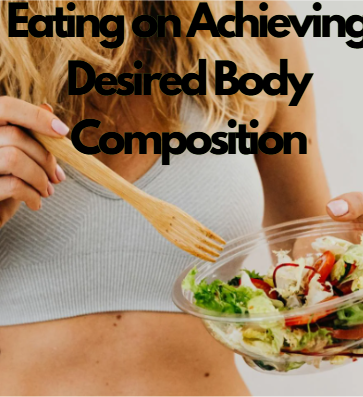The Impact of Mindful Eating on Achieving Desired Body Composition In a world dominated by calorie-counting apps, trendy diets, and 30-day fitness challenges, mindful eating might seem too slow or too simple to impact your body composition. But science—and countless success stories—tells a different tale. When you combine nutrition knowledge with mindfulness, you unlock a powerful tool not just for fat loss, but for sustainable transformation.
If you’re struggling with overeating, emotional eating, or yo-yo dieting, this article will show you how mindful eating can shift your mindset, reshape your body, and create lasting results. Let’s break down how and why it works.
What Is Mindful Eating?
Mindful eating is the practice of being fully present and aware during meals—paying attention to hunger cues, flavors, emotions, and satisfaction without judgment. It’s about reconnecting with food, not controlling it.
Key Principles of Mindful Eating:
- Eat slowly and without distraction.
- Listen to hunger and fullness signals.
- Savor each bite.
- Recognize emotional triggers for eating.
- Appreciate the food’s origin, quality, and effect on your body.
It’s the opposite of mindless snacking in front of a screen or emotional eating out of stress. Mindful eating brings intention and awareness into your meals—leading to smarter choices, natural portion control, and ultimately, a healthier body composition.
Why Body Composition Matters More Than Just “Weight Loss”?
When we talk about body composition, we’re referring to the ratio of fat to muscle in your body. Two people can weigh the same, but look completely different depending on their muscle mass and fat percentage.
Focusing on body composition—rather than just scale weight—ensures you:
- Maintain or gain lean muscle
- Lose body fat effectively
- Improve shape, tone, and strength
- Avoid muscle loss and metabolic slowdown
Mindful eating doesn’t just help with fat loss—it helps you preserve muscle, reduce bloating, and feel better in your skin by promoting intentional, nutrient-dense eating over binge-restrict cycles.
How Mindful Eating Supports Fat Loss?
Fat loss happens when you consume fewer calories than you burn. But here’s the problem: most people don’t overeat because they’re hungry—they overeat because they’re distracted, stressed, or emotionally triggered.
Here’s how mindful eating helps:
1. Reduces Overeating
Eating slowly and checking in with your hunger helps you stop when you’re full—not stuffed.
2. Improves Food Satisfaction
You’re less likely to binge when you actually enjoy your meals. Mindful eaters report more satisfaction from fewer calories.
3. Breaks Emotional Eating Patterns
Mindfulness teaches you to pause and ask: “Am I hungry, or just stressed/tired/bored?” That moment of awareness changes everything.
4. Boosts Digestion
Eating in a relaxed state activates your parasympathetic nervous system, leading to better digestion, nutrient absorption, and less bloating.
5. Increases Awareness of Triggers
You’ll learn to notice patterns—like nighttime cravings or afternoon sugar binges—before they spiral into habits.
How Mindful Eating Supports Muscle Retention and Lean Gains?
You can’t build or maintain muscle without proper fuel—and mindless eaters often:
- Skip meals
- Miss protein targets
- Undereat post-workout
- Overeat on “cheat days”
Mindful Eating Ensures:
- You meet your daily protein needs by tuning into hunger and planning meals.
- You fuel your workouts with proper pre- and post-workout nutrition.
- You recover better, sleep better, and train harder—all of which impact lean muscle gains.
Mindfulness makes you more intentional with your eating, helping you support your workouts and preserve your physique.
How to Practice Mindful Eating (Step-by-Step)?
Ready to try it? Here’s a beginner-friendly guide to eating more mindfully today:
Before Eating:
- Ask yourself: “Am I truly hungry?”
- Rate your hunger on a scale from 1 (starving) to 10 (stuffed)
- Serve yourself a reasonable portion
During Eating:
- Eliminate distractions (TV, phone, scrolling)
- Chew slowly—aim for 20–30 chews per bite
- Pause between bites
- Focus on the taste, texture, and smell of your food
- Check in halfway through: Am I still hungry?
After Eating:
- Rate your fullness
- Reflect: Did you eat for hunger, or another reason?
- Notice how your body feels—energized, sluggish, satisfied?
The goal isn’t perfection—it’s progress and awareness. With practice, mindful eating becomes second nature.
Real-Life Benefits People Report
People who consistently eat mindfully often say:
- “I stopped binge eating.”
- “I lost weight without counting calories.”
- “I enjoy food more and stress less.”
- “I finally have control over cravings.”
- “My digestion improved.”
- “I feel more in tune with my body.”
These aren’t small wins—they’re major breakthroughs in both health and confidence.
Combine Mindful Eating with Training for Optimal Results
Want to truly transform your body? Combine mindful eating with strength training and light cardio. Together, they:
- Reduce fat mass
- Increase lean muscle
- Improve body shape
- Enhance metabolic function
With a calm, conscious approach to eating and consistent physical activity, your dream body becomes an achievable, sustainable reality.
Conclusion: Transform Your Body from the Inside Out
Mindful eating is not a fad. It’s a lifestyle. One that helps you lose fat, protect muscle, and most importantly—heal your relationship with food.
You don’t need another strict diet. You need presence. Awareness. A return to your body’s natural wisdom. Because when you learn to eat with intention, you unlock your body’s full potential—inside and out.
FAQs
1. Can I lose weight with mindful eating alone?
Yes—many people reduce their calorie intake naturally just by eating more slowly and stopping when full.
2. Do I need to track calories if I eat mindfully?
Not necessarily. Mindful eating often leads to intuitive portion control, though tracking can be helpful during a learning phase.
3. What if I struggle with emotional eating?
Mindful eating helps you become aware of emotional triggers. Pair it with journaling or therapy for even greater results.
4. How long does it take to see changes from mindful eating?
Many people notice less bloating, fewer cravings, and better energy within 1–2 weeks. Body composition changes follow with consistency.
5. Can I eat anything I want mindfully?
Yes—but with awareness. Mindful eating helps you enjoy all foods in moderation, not eliminate them




